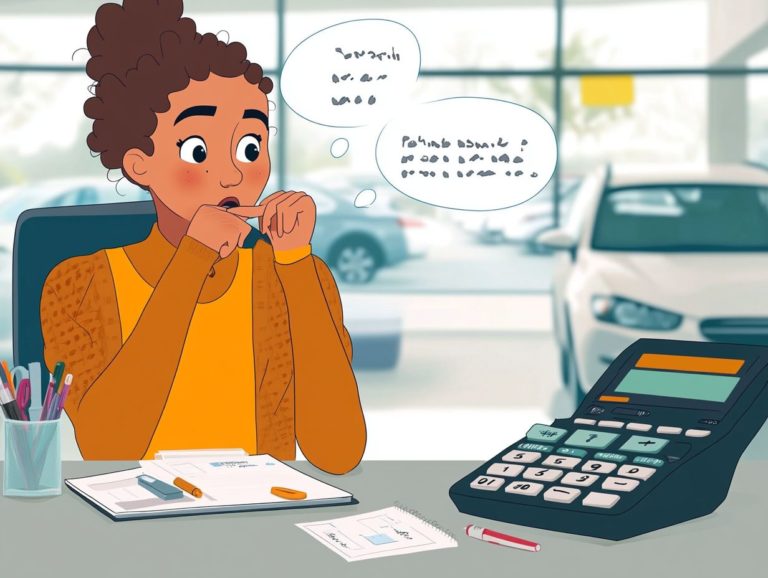Strategies for Negotiating with Private Sellers
Negotiating with private sellers can be a thrilling way to snag an incredible deal!
Whether you’re in the market for a car, a piece of furniture, or even a home, understanding the details of how to negotiate is essential.
This guide will lead you through the negotiation process beginning with the significance of negotiation itself, moving on to effective preparation, employing successful techniques, and addressing challenging situations with poise.
When you finish this guide, you’ll be ready to tackle negotiations with confidence and excitement, ensuring a seamless transaction every single time.
Contents
Key Takeaways:

Negotiation is crucial when dealing with private sellers, as it allows for finding a fair price and building a good relationship.
Before negotiating, research the market and the seller to better understand their motivations and set realistic goals and budgets.
Effective negotiation techniques include active listening, clear communication, and offering and countering to reach a mutually beneficial agreement.
The Importance of Negotiating with Private Sellers
Negotiating with private sellers in the used car market is essential for securing the best deal on your next vehicle purchase, and you can also benefit from tips for negotiating with online dealers.
Understanding the negotiation process empowers you as a buyer, especially if it’s your first time.
By leveraging effective negotiation tips, you can determine the market value of the vehicle you’re interested in. Gathering information on current market rates enables you to navigate the intricacies of private negotiations confidently, ensuring you create a win-win situation that culminates in a fair price and a successful sales contract.
Why Negotiation is Key in Private Sales
Negotiation is essential in private sales, allowing you to engage directly with sellers. This interaction ensures you fully grasp the vehicle’s condition and gather critical information, like the vehicle history report, details on previous owners, and any mechanical or cosmetic issues.
Unlike dealerships, which often provide limited insights into a car’s past, private sales present an opportunity to dig deeper into a vehicle’s history. You can pose specific questions about maintenance, accidents, or repairs that may not be officially documented. This direct communication can unveil hidden problems issues that might be overlooked in a more formal dealership environment.
As a savvy buyer, you can leverage negotiation not only to secure a fair price but also to uncover potential red flags that could sway your ultimate decision. Understanding these unique dynamics gives you the power to make informed choices, ensuring a more satisfying purchase experience.
Preparing for Negotiations

Preparing for negotiations is a crucial step that requires you to engage in comprehensive research of the marketplace.
Familiarizing yourself with car pricing guides, such as Kelley Blue Book, will give you the power to establish a fair starting price for the vehicle you intend to purchase.
Researching the Market and the Seller
Researching the market and the seller is crucial for you as a first-time car buyer. It gives you the power to grasp current market rates and the value of similar vehicles listed on platforms like eBay Motors, Craigslist.org, and Facebook Marketplace.
To make a savvy investment, you’ll want to analyze listings that closely match your desired model. Delve into detailed car reviews, particularly from reputable automotive websites, as they offer valuable insights into the vehicle’s performance, safety features, and reliability ratings.
Verifying the seller’s credibility is an essential step you shouldn’t skip. By checking ratings, reviews, and past sales, you can assess their trustworthiness.
And don t forget about the VIN, which is a unique code for each vehicle this is key to uncovering a vehicle’s history, revealing critical details like accident records and re-registration unless it’s been tampered with. Armed with this information, you can navigate the purchasing process with much greater confidence.
Setting a Budget and Goals
Setting a budget and clear goals is vital when buying a car. It helps you determine a fair price and set your starting price during negotiations.
Outline a realistic budget. Don t forget to consider costs like taxes, registration, and insurance. It’s also important to identify specific goals for what you want from the negotiation whether it’s a particular make or model, certain features, or warranty coverage.
Flexibility is key in this process. Being open to adjusting your expectations based on market conditions and available options can lead to better outcomes.
Researching comparable vehicles boosts your confidence in negotiations, allowing you to approach them with clarity.
Effective Negotiation Techniques

Mastering effective negotiation techniques is essential for securing successful outcomes. By honing your active listening skills and refining your communication, you create an environment conducive to productive price negotiations and strategic counteroffers.
Active Listening and Communication
Active listening and clear communication can profoundly shape your negotiation outcomes.
By immersing yourself in the conversation, you gain insight into the seller’s perspective while effectively voicing your own needs. Engaging in dialogue helps uncover underlying interests that might not be immediately apparent.
This approach fosters trust and encourages collaboration, as both parties feel valued. Prioritizing listening allows you to spot opportunities for mutual gain, turning discussions into solutions that benefit everyone involved.
Ultimately, mastering active listening creates an environment where innovative ideas flourish, paving the way for a successful bargaining experience.
Offering and Countering
Offering a fair initial price and managing counteroffers effectively are essential components of the negotiation process.
Your initial offer sets the tone for everything that follows. Conduct thorough market research to establish a well-informed price point while considering the value you bring to the table.
When faced with a counteroffer, being responsive is crucial. Using active listening helps you understand the other party’s priorities, paving the way for collaborative problem-solving.
By integrating these negotiation strategies, you can foster a productive dialogue, leading to a successful agreement that satisfies everyone involved.
Handling Difficult Situations

Navigating challenging scenarios whether facing aggressive sellers or tackling price disputes demands a strategic mindset and effective techniques. This approach enables you to maintain control and secure the outcomes you desire.
Dealing with Pushy Sellers
Dealing with pushy sellers can be a challenge, but effective strategies allow you to maintain composure and control throughout the process.
To navigate these encounters successfully, adopt a calm demeanor. This fosters clear thinking and focused dialogue. Actively listening to the seller s pitch shows respect and gives you valuable time to formulate responses.
Setting clear boundaries early on can deter aggressive tactics. A firm yet polite “no” often halts pressure in its tracks. Preparing a list of your priorities and non-negotiables keeps your goals front and center during discussions.
This method grounds you and gives you the power to counter overwhelming strategies employed by the seller, fostering a more balanced interaction.
Navigating price disagreements is a crucial aspect of the negotiation process. It requires a clear understanding of fair pricing and effective strategies to secure a favorable outcome.
Approaching negotiations with a well-researched perspective on market values gives you the power to articulate your position with confidence. This lays a strong foundation for productive discussions.
Preparing data on comparable prices or historical sales can be invaluable. It enables you to make informed counteroffers that underscore the value of your proposition.
Active listening is essential in these conversations. Truly understanding the other party’s concerns can lead to solutions that benefit both sides.
Using techniques like anchoring starting negotiations with a price higher or lower than what you expect can guide the negotiation toward a satisfying agreement.
Closing the Deal
Closing the deal necessitates finalizing the details and facilitating a seamless transaction. Both aspects are crucial to securing the purchase and ensuring your satisfaction with the used vehicle you re acquiring.
Finalizing the Negotiation and Sale
Finalizing the negotiation and sale demands keen attention to detail, particularly when reviewing the sales contract. It s important to ensure that all information, including the vehicle history report, is both accurate and satisfactory.
At this stage, you and the seller must engage in a thorough examination of every facet of the transaction to sidestep potential pitfalls.
For instance, verify that the seller’s disclosures about the vehicle s condition match the insights provided by a trusted mechanic. Clarity in all documentation is paramount, as misunderstandings can lead to complications later on.
Ensuring warranties are clearly defined and any fees explicitly outlined prevents unwelcome surprises once the sale is finalized. By double-checking these critical elements, you contribute to a smooth and successful transaction.
Ensuring a Smooth Transaction
Ensuring a smooth transaction is essential for a successful car purchase. It requires meticulous verification of all details, such as the vehicle identification number and repair records.
Start by conducting a thorough inspection of the vehicle. Confirm that all features operate as advertised. Next, securing a comprehensive vehicle history report will provide valuable insights into any past accidents, title issues, or odometer discrepancies.
Before finalizing the deal, it s essential to confirm your financing options and review the terms of any warranty that may accompany your purchase.
A final walkthrough of all paperwork will ensure that all figures align with your previous discussions and that both you and the seller are in agreement. These careful checks are crucial they protect you from unpleasant surprises later!
Frequently Asked Questions
- Do your research: Before negotiating, look up the market value of similar items.
- Start with a lower offer: Begin with a lower price to give yourself negotiating room.
- Be confident: Show the seller you are serious and knowledgeable.
- Find common ground: Build rapport by identifying shared interests.
- Be prepared to walk away: Show you’re not desperate, which might encourage a better offer.
- Consider non-monetary offers: Offer services or goods if the price won t budge.






